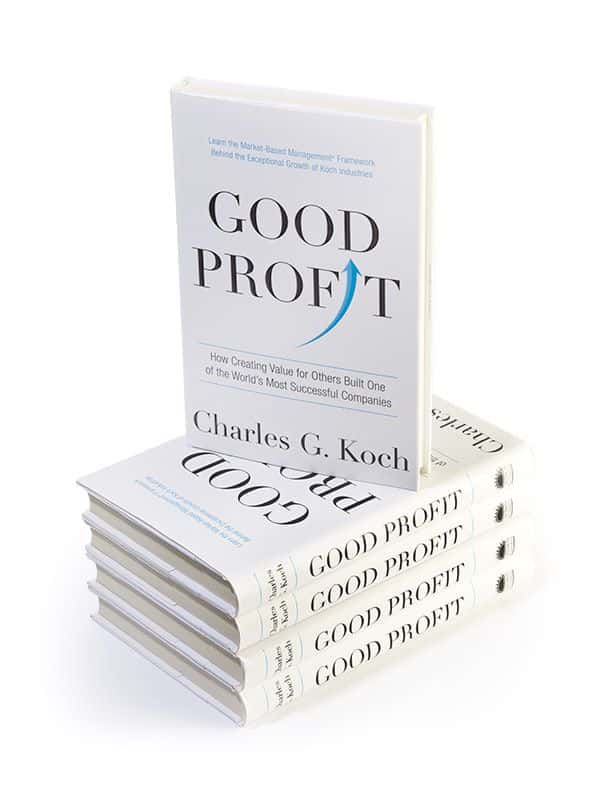“Good Profit: How Creating Value for Others Built One of the World’s Most Successful Companies” is a book by Charles Koch, the CEO of Koch Industries. It delves into the principles and methodologies behind Market-Based Management (MBM) and how it has contributed to the success of Koch Industries.
In the book, Koch explains the concept of “good profit” – profit earned by creating value for others, be it customers, employees, or society. He emphasizes the importance of long-term thinking and investment in innovation while discussing the value of eliminating waste, continuous improvement, and maintaining a culture of accountability. Koch provides practical examples, anecdotes, and case studies from Koch Industries to illustrate how these principles have been applied in their business operations.
The book also highlights the importance of personal growth and integrity, emphasizing creating an environment that encourages collaboration, open communication, and empowering individuals within an organization. Koch stresses the significance of learning from failures, adapting to changing market dynamics and striving to improve business practices.
Overall, “Good Profit” serves as a guide to understanding and implementing the principles of Market-Based Management, providing insights into how Koch Industries has achieved sustained success by creating value for others and fostering a culture of continuous improvement.

What is Market-Based Management (MBM)?
Market-Based Management (MBM) is a holistic approach combining theory and practice to help organizations effectively navigate change and achieve growth. It draws lessons from failures and successes to drive prosperity, peace, and organizational progress.
MBM emphasizes the importance of organizational culture, which consists of the set of values that define an organization’s identity, operations, and priorities. These values shape the organization’s approach to external adaptation and internal integration. Additionally, organizational values play a significant role in establishing the corporate brand, influencing public perception, and driving returns regarding sales and brand image.
By applying the principles of mutual benefit, MBM empowers individuals and organizations to succeed in the long term. It focuses on marketing performance, profitability, and the role of marketing strategies in building business profits. Moreover, MBM incorporates metrics and analytics and recognizes the impact of technology on marketing.
Overall, market-based management provides a framework for creating value for individuals in communities, team members within an organization, and society as a whole.
The fundamental principles of Market-Based Management are:
Vision: MBM begins with a clear vision and understanding of what a company wants to achieve. This vision serves as a guiding star for the organization.
Virtue and Talents: MBM emphasizes the importance of virtue (integrity, compliance with ethical standards) and talents (the skills and abilities of employees) in achieving success.
Knowledge Processes: Knowledge is considered a critical asset, and organizations are encouraged to create systems for acquiring, sharing, and applying knowledge effectively.
Decision Rights: MBM advocates for decentralized decision-making, where individuals closest to the situation are empowered to make decisions. This enhances accountability and efficiency.
Incentives: Properly structured incentives align the interests of individuals with the company’s goals, encouraging value creation and good profit.
Knowledge Sharing: Open and transparent communication is promoted to share knowledge, best practices, and feedback throughout the organization.
Ownership: Encouraging employees to think and act like owners, taking responsibility for their work and its impact on the company.
Long-Term Perspective: MBM emphasizes a long-term view, focusing on sustainability and continuous improvement rather than short-term gains.
Empowerment and Accountability: Employees are empowered to act and make decisions within their areas of expertise, but they are also held accountable for their actions and results.
Market-based management provides a structured approach for organizations to develop a culture of continuous improvement, ethical behavior, and value creation. It has been applied successfully by Koch Industries and has gained attention as a model for sustainable and responsible business management.
Comparison with the RoundMap Framework
Market-based management (MBM) is a management philosophy developed by the Koch Industries conglomerate that seeks to promote free-market principles within organizations. According to Koch, MBM involves five dimensions: vision, knowledge processes, virtue and talents, decision rights, and incentives. The emphasis is on empowering employees to make decisions that promote the long-term success of the organization and to align organizational structure and incentives with free-market principles.
In contrast, the RoundMap framework is an integrated business framework developed by Edwin Korver that aims to address the problem of stagnating or declining growth in organizations. The RoundMap framework is intended to help organizations become more resilient and innovative by focusing on eight main areas: strategic positioning, governance, leadership & culture, finance, markets & customers, processes & systems, products & services, and suppliers & partners.
The main difference between the two frameworks may lie in their approaches. While both seek to promote long-term organizational success, MBM emphasizes empowering employees and aligning structures and incentives to promote free-market principles. In contrast, the RoundMap framework emphasizes a broad focus on various organizational areas to address challenges to growth and promote innovation.
It is worth noting that both frameworks have their proponents and detractors, and their effectiveness may depend on the specific organizational context. More research would be needed to compare and evaluate the frameworks against each other thoroughly.
Author
-
Edwin Korver is a polymath celebrated for his mastery of systems thinking and integral philosophy, particularly in intricate business transformations. His company, CROSS-SILO, embodies his unwavering belief in the interdependence of stakeholders and the pivotal role of value creation in fostering growth, complemented by the power of storytelling to convey that value. Edwin pioneered the RoundMap®, an all-encompassing business framework. He envisions a future where business harmonizes profit with compassion, common sense, and EQuitability, a vision he explores further in his forthcoming book, "Leading from the Whole."

